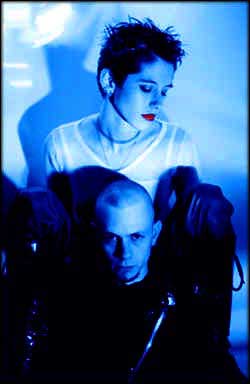
Flesh Field
The Digital Prophets speak...
An in-depth interview with Flesh Field

The musical project currently known as Flesh Field began, under a different name, in 1993 as a solo project authored by Ian Ross. In 1996, the project's name was changed to Flesh Field and, in late 1997, it stopped being a solo project with the joining of Rian Miller.
In July 1999 the first Flesh Field full length CD, "Viral Extinction", was released in the US by the then nascent label Inception Records. Almost a year later it was released in Europe by [Trisol]. This was followed by the "Redemption" EP.
Featuring powerful beats, heavy distortion, haunting lyrics and an unusual combination of male and very talented female vocals, both releases by this relatively young band caused a significant stir in the American and European electro scenes.
Soon, Flesh Field's second full length CD, "Belief Control", will also be released. [At the time this interview is uploaded on nsi-online Belief Control was already released - l.r.s.]
GA - Maybe a bit of historical background should be in order... how did Ian start the Flesh Field project? And how did Rian end up joining it?
IAN: I started messing around with writing music back when I was about 15 years old. It was never anything serious... I just did it because it was fun, and provided a creative outlet for me. I did solo stuff under several different names, but I started working under the name "Flesh Field" when I was about 18.
RIAN: I met Ian through a mutual friend we had, and told him I was a singer. He asked me if I wanted to sing a song for a band he had. I said yes. We met together and recorded a few songs, and a little while later he asked me to become a full-time member of the band.
GA - Before Flesh Field, Ian had some past projects (Vitamin, Catch22 and Fragment of Tranquility). Can you tell us a bit more about those projects and if they influenced Flesh Field somehow?
IAN: Vitamin was a group of guys I went to high school with. We were mostly a punk/funk type of band, except that instead of using a bass guitar, I did all of the bass work on the synth. It was a lot of fun, and we actually won our high school's "Battle of the Bands". Catch22 was another high school band, however it was more of a coldwave act, with me on synths, a guy named Tim Piazza on guitar, and a guy named Wes Benson on vocals. We won second place at the same "Battle of the Bands"... hehe.
Both Vitamin and Catch22 disbanded after we graduated. Fragment of Tranquillity started out after high school as myself on synths, Tim Piazza (who was the guitarist for Catch22) on synths and percussion, and Scott Tron on vocals and synths. Tim and I had a falling out after a few months of the bands existence, and Scott and I continued to work on music together. The music was slow and dark, and I wanted to do something heavier and faster. Scott began to work on his own project, and I began to focus solely on Flesh Field. Scott is actually the live keyboardist for Flesh Field now... and our next door neighbour.
GA - The obvious question... why the name "Flesh Field"?
IAN: It was a term I made up to describe a psychological defense mechanism in rape victims. My music was a good defense mechanism for me while I was dealing with the fact that my girlfriend at the time had been raped. I felt it was only natural to name the band after a defense mechanism, since in essence, that's exactly what it was to me.
GA - Going even further back in time, what and how did you get into music initialy? In Rian's case it becomes readily apparent (especialy in a song like "My Saviour") that she must have had some sort of musical and vocal training in the past, am I correct?
IAN: I really got into music when I was about 14. I heard Nine Inch Nails, and that opened up a whole world of electronic music for me. Nails led to Ministry and KMFDM, which led to Frontline Assembly and Skinny Puppy, which lead to LeŠther Strip and :wumpscut: and the like.
RIAN: Yes, I have had formal training. I have studied music and voice for about 10-12 years. Everyone in my family also has some form of musical talent, whether it is playing an instrument or being able to sing. I have taken lessons from an instructor, but my biggest influence was a high school music teacher I had. She helped me to realize my full potential.
GA
- A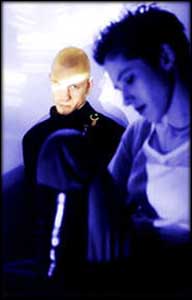 bout
musical influences, what would you say were your main musical influences in the
past and what are they now?
bout
musical influences, what would you say were your main musical influences in the
past and what are they now?
IAN: Nine Inch Nails would be the most influential, as they were the band that got me interested in both listening to and writing music. LeŠther Strip influenced me to take the music to a purely electronic level. There are a lot of other bands that really inspired me to try different directions, but those are the big 2. I was also very fond of Lords of Acid. These days, most of the stuff that influences me comes from classical symphony or movie scores.
RIAN: I couldn't really give you any specific band that influenced me, vocal wise. It was more people whom I knew and grew up with supporting me.
GA - Apart from electro and related music, what kind of music do you listen to?
IAN: A lot of movie scores. I listen to a lot of Hans Zimmer's stuff. Other composers such as Howard Shore, Eric Serra, and Basil Poledouris have been in heavy rotation in my CD player as well. I still listen to quite a bit of electronic stuff... everything from electro or EBM to power noise, to drum and bass, to trip hop, to IDM.
RIAN: Believe it or not, music is not my main area of focus. I don't really have a lot of time to just sit down and listen to music. Normally when I do it is electronic music, electro, synthpop, techno, etc.
GA - Can you pick a person/band and an album that you'd consider as having had a significant impact in your musical formation and orientation? How did it have that effect?
IAN: Again, Nine Inch Nails would be the most influential band for me. I had never heard music done like that before, and had no idea electronics could sound so aggressive.
RIAN: Like I said before, my high school music teacher had the most impact on me.
GA - Unless I am mistaken, you are both currently in college. Apart from obvious time constrains, how does college influence your musical activity? Do you feel that it somehow helped shape you as an artist as well?
IAN: It doesn't really influence it too much. Occasionally it may help me with lyrical content, but that's about it.
RIAN: It doesn't really influence me. It does affect show schedules. Obviously if we are in school, we can't be travelling around to do tours.
GA - What would you say are the defining characteristics of Flesh Field: musicaly, content and in terms of goals/objectives? This without implying there should be a message of any kind...
IAN: Musically, the most defining characteristic would probably be the fact that we incorporate male and female vocals. Other characteristics would be heavy percussion and, in the new material, a lot of symphonic elements. The overall goals? I dunno... writing music has always been nothing more than a release for me... a healthy way to vent. I could care less about being innovative, original, or even intelligent with the music. It helps me more than any psychologist ever could, and that's the only thing that's important to me.
RIAN: It began as more of a hobby and has ended up being more of a job :-) . It's not that I don't enjoy doing it, sometimes it just takes up more time than I have. As for goals, I'm not really sure. I will always be a singer, no matter if it's in a band or not.
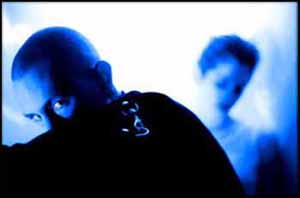
GA - Usualy, how does the process of of creating a song/musical piece work for the two of you?
IAN: It's really basic. I write the music... then we sit down and write the lyrics. Then we record them.
GA - Which one of you would you say is mainly responsible for the Flesh Field lyrics? How are the lyrics written? Are the lyrics created as the music is created or are they written before the music, are they modified to fit the music or vice-versa?
IAN: Well, on the older stuff, I was more responsible for the lyrics... which didn't quite work well for us since I can't write very good lyrics. With the new album, it was an equal separation... she wrote her parts, and I wrote mine. If either of us needed help, we went to each other, but for the most part, each part you hear me sing, I wrote, and each part you hear Rian sing, she wrote. The lyrics are usually written after the song is finished, however sometimes my lyrics are written right along side the writing of the music. When I first started writing music, I usually had a ton of lyrics written well before the songs were finished, but since I've become more focused on the music than the lyrics these days, there has only been one song where the lyrics came before the music... that would be a track called "Allegiance" off of the new album.
GA - Did you ever consider using lyrics from external sources (i.e. not made by any of you)?
IAN: Not really, unless you mean lyrics that were written by others specifically. for one of our songs. I've invited people to write lyrics for us once or twice, but it never panned out.
GA - About your debut album, "Viral Extinction". An apocalyptical piece of work, most definitely; I might even risk the description "running through a barbed wire no-man's land during a viral outbreak with Judgement Day nuclear firestorm fast aproaching"... [laugh all you want, it's late at night as I write this ;-) ] The biblical references in this album are too obvious to be ignored.
This may sound a trifle weird but, bearing in mind that european and american attitudes towards religion are like water and wine: were those references intentional or are they the result of some sort of subconscious american religiousness?
IAN: Good question. The US is definitely a lot more religious-minded than Europe. Maybe it did have some unconscious effect on me. I am not a religious person at all, although some aspects of it fascinate me. I would probably have done the same thing regardless of whether I lived in the States or in Europe, however.
GA - "Belief Control", the new Flesh Field album is soon to be released. What can the public expect from this new Flesh Field album? What will be the overall thematic this time?
IAN: It's a lot different (in my opinion, at least) than anything we've ever done before. I tried a lot of different things that I never thought I'd try with it. It's not as dark or aggressive as "Viral" was. This is not to say that it is "light" or slower paced. It's still aggressive, and the songs are still at a somewhat high BPM. I originally thought it was going to be noisier, but it ended up being a lot more melodic than anything. It's a lot more polished, and a lot more complex than anything we've done. The production is infinitely better. My vocals are less distorted, while Rian's are a bit more treated. There is an overall theme to the disk, although I don't think we're ever going to come out and state exactly what it is. Let people get from it what they want (if they get anything from it at all). People seem to be associating the title with religious themes, and if that's what they get from it, then fine. But I expect that once (or IF) they read the lyrics, they may change their mind.
GA - Even not having heard the new album, just a few demo clips, there is a somewhat aparent musical evolution. The new tracks on the "Redemption" EP seem to indicate a clearer a more melodic approach with more protagonism to the vocal parts as well as clearer sound while at the same time maintaining the same level of aggressivness.
How do you feel the Flesh Field sound evolved from "Viral Extinction" to "Belief Control"?
IAN: I think it's matured. The new album blends a few different styles of music together that I'd never attempted to blend before. The production has evolved quite a bit, as well as the sound design. The first two tracks on the disk don't really indicate too much of a change, but once those are finished, it becomes a bit more experimental in terms of what we've done before. There are some acoustic elements on the disk, mostly in terms of the symphonic and percussion elements, which is something I didn't have much interest in before I started working on the album. I work very quickly when I write, and I'm already a bit bored with "Belief Control" and have been working on new material that juts off in yet a different direction. There will always be a few key elements that remain in our music, but hopefully each release continues to show an evolving sound.
GA - Flesh Field was the first band signed by Inception Records. Since then, the label has grown quite a bit and a plethora of other bands, from all over the world, both new and old, have signed up under Inception's umbrella. Did Inception Records have any role in ultimately shaping the Flesh Field sound?
IAN: No, not really. We were the sound they were looking for at that time. They give us complete freedom when it comes to experimenting and trying new things. The only thing they request is that there be at least one dancy track on the album so that Switch can shake his little Canadian ass to it.
GA - Did the growth of the label open new possibilities for Flesh Field both in terms of band promotion but also (and especialy) in terms of cooperation with other bands and projects?
IAN: Definitely. We've become good friends with many of our label mates, as well as with the Inception staff. We've hung out with and even stayed with many of the other acts, or have had them stay with us when they come through town. We are in constant contact with many of them. The only real musical cooperation would be in regards to remixes, however. But that works for me. I've always been a fan of Individual Totem, and now that they are on Inception, the likelyhood of getting a remix from them increases greatly. WOOHOO!!!
RIAN: Absolutely! We are cool with everyone that is on the label. As Ian said, we have met most of them. It is really great to have such a close label in which everyone knows one another and gets along.
GA - Apart from remix oportunities, have there been any propositions for Flesh Field to collaborate in other projects? Is there something down the line in that area?
IAN: I'm not sure. I'm not very willing to compromise when it comes to my music, so that may be a problem when it comes to working with others. It may be fun, but I'm not sure if it will happen anytime soon outside of remixes.
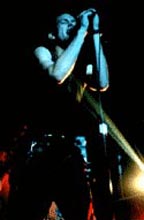
RIAN: I have gotten a lot of offers to do guest vocals with other bands. I have already done some with Dubok and Assemblage 23. I hope that things work out so that I can continue to work with bands that I enjoy, as it provides me a chance to do vocals for different types of electronic music, and hopefully makes me grow as a singer.
GA - It seems to be a trend amongst past american industrial bands to have marked rock influences, with the use of more "traditional instruments" like guitars and drums, even if heavily distorted. Bands like Razed In Black, Kevorkyan Death Cycle and Penal Colony are quite good examples although there were a few others that escaped this trend (Kode IV, Blue Eyed Christ). Is this a wrong observation? If not, do you think that there is a tendency nowadays in shifting towards a more 'keyboard oriented' sound?
IAN: Yes, there was definitely a tendency for guitar driven music from American bands in the past. These days, we don't seem to have nearly as many. Guitars aren't necessarily a bad thing. I've used them before in a few tracks, and no one ever really said anything. There is a guitar used once or twice on the new album as well, albeit it's very minimal, and in the background. Many of the acts coming out of the US and Canada today aren't using them as much. Velvet Acid Christ, Gridlock, Converter, Dubok, God Module, Assemblage23, Imperative Reaction, Lost Signal, Pulse Legion... to name a few... many of these bands have used the occasional guitar before. VAC did, Sturgis did on a few of his Pain Station tracks, Gridlock used one on "The Synthetic Form". Likewise, some European bands have done this as well. (:wumpscut:, Psychopomps, Funker Vogt). I don't see anything wrong with using the occasional guitar. But I think Americans have come to realize that you don't need to have a guitar in order to sound aggressive or heavy. That is not to say that any of them necessarily wanted to sound heavy or aggressive...
GA - Musicians and their audiences reflect each other after a fashion. How do you view the american 'scene' and in what do you think that it differs from its european counterpart?
IAN: They're actually quite similar, if you remove the fact that the numbers of people in the American scene is much smaller. There's a lot of bullshit politics in both. There are a lot of die-hard fans in both. I think the European scene tends to be a little less critical of the music than the American scene, but that probably has to do with the fact that the American scene is more "underground" than it's European counterpart, and many here want it to stay that way.
RIAN: Like Ian said, the American scene is much smaller than the European scene, but hopefully that will change. There are many people in the US scene that want it to stay a small scene, and I don't quite understand that. I guess they don't want anyone that is mainstream listening to "their music". I hope that this view changes, and that many more people will realize the "industrial" scene for what it is... whatever that is :-) .
GA - Quite a few of the earlier electro-industrial bands had marked ideologial positions (Front 242 and Birmingham 6 to name two of the most obvious ones), usualy towards the left-wing of the political spectrum. Where do you think the american 'scene' is headed to? Would you say there is any underlying ideology to the american 'scene' as far as the society outside is concerned, has it turned towards itself, is it simple show-off or something in between?
IAN: Good question. There are definitely bands over here with certain ideologies behind what they do. I think the return of a republican president will actually boost the political and ideological elements in some of America'a bands. That seems to be the case in the past, at least. It depends a lot on circumstance. What are some big issues that people feel strongly about over here? This happens with mainstream pop music as well. During the Vietnam war, there were a lot of politically driven bands and songs. Nowadays, when there is no war, and no big issues in the media, we've got music like Britney Spears, and The Backstreet Boys. A lot of times, music is a reflection of environment and circumstance.
GA - What are the positions of the members of Flesh Field as far as ideology goes and what are your opinions as far as world issues go? Is any of you involved in any activist movement of any sort?
IAN:
I've got opinions on just about everything... heh... I think there is a definite
ideology behind what we were writing about with "Belief Control". Even
though it's a personal album for us, it reflects our views on certain social and
political issues. Flesh Field, for me, is about getting things out of my system,
be it emotional, political, personal, social, or whatever. This is not so say
they we don't feel strongly about anything enough to make an entire album
dedicated to a single issue...
We are not really involved with any movements or anything... I'm too much of a
hermit. I am quite interested in making as much fun of George W. Bush as I can,
however. It's too easy sometimes, though. Give me a challenge here, George!
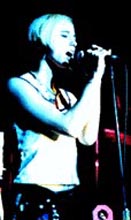
RIAN: We both have our opinions on things, and surprisingly, they don't always agree. Eh, world issues is a difficult subject. There are too many to mention. I'm not actively involved in any political movements or anything.
GA - Politics leading to mercantilism... what do you think is the possibility of the electro-scene becoming target for mercantilist exploitation? Would you consider that as a serious possibility?
IAN: It's possible, but I doubt it will happen anytime soon, especially considering what's popular in the mainstream today. If an electro band suddenly comes out with a video that goes to MTV and becomes a huge hit, then I can see it happening... but let's face it... there are very few electro bands with any truly great videos that would be playable on MTV. Collide's "Song of a Preacher Man" video was cool, though...
RIAN: Doubtful that it will happen soon. Maybe someday... you never know... look what happened to Nails :-) .
GA - Going back to lighter issues here... you once mentioned touring as impossble due to college obligations. Even then, any chance of dropping around Europa at some point and playing a couple of gigs somewhere?
IAN: We were actually just on tour in Europe with L'ame Immortelle and Janus. We played fifteen shows, mostly in Germany, but we also hit the Netherlands, Belgium, Austria, and Switzerland. If our next album does well enough to warrant touring over there again, we'd do it in a heartbeat.
GA - Any final words or final requests? ;-)
IAN: Thanks for the interview! This has been one of the best we've had the privilege of doing, and definitely the longest. Also, thank you to everyone who has supported us along the way.
RIAN: Thanks for the interview. You asked some tough, but very interesting questions. Much different than the normal ones...
(May, 2001 - uploaded on nsi-online March, 2002))
-- by Sick Boy, originaly published in the Goths Anonymous webzine (http://gothsanonymous.tripod.com)